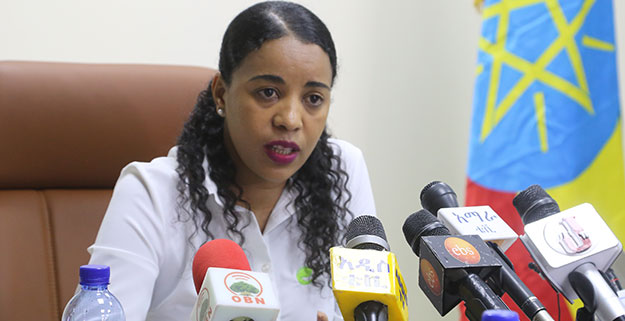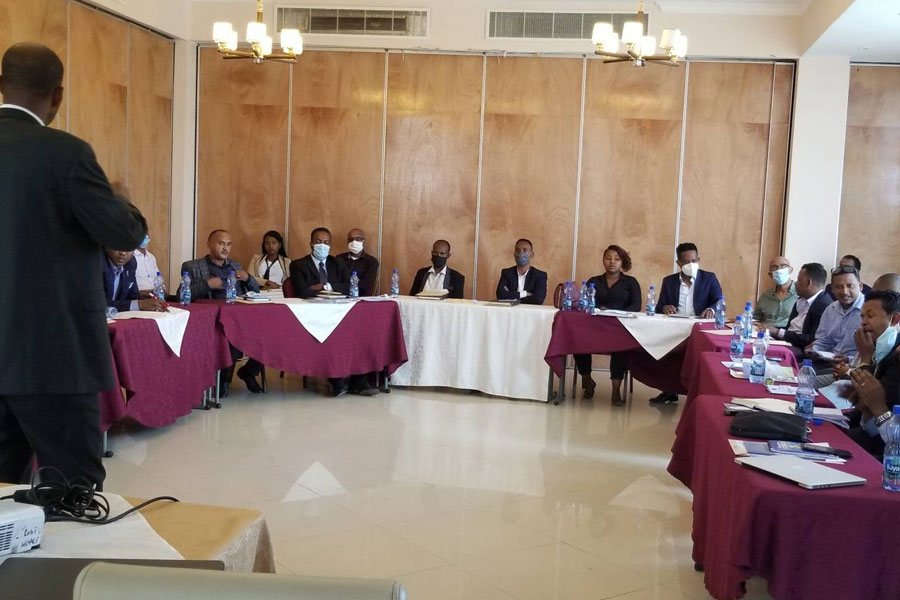
Radar | Aug 07,2021
The government plans to issue a request for an expression of interest next month inviting interested telecom operators to take part in the privatisation process of the state giant Ethio telecom.
So far, multiple renowned international telecom operators have been approaching the government with requests to take part in the privatisation process, according to Eyob Tekalign (PhD), state minister for Finance.
“Currently, we aren’t open for any negotiations until we start the bidding process, which we expect to be launched next month,” Eyob told Fortune.
The government targets to complete the partial privatisation process of Ethio telecom in the coming nine months. Keeping a majority share of 51pc, the government will leave the remaining shares to the overseas companies.
Before the privatisation process of the company, the government is also planning to split the company into two divisions: infrastructure and service.
“It will be restructured for competition’s sake,” Eyob said at the end of last week at a briefing for members of the media on the status of the privatisation process of Ethio telecom and the sugar factories.
The infrastructure division will be managing the international network, installation of the national fibre optic infrastructure and installation of towers. The service provider segment will oversee the retail activities of the mobile and fixed line as well as internet services.
“For the privatisation process, we will have transparent but stringent bidding procedures,” Eyob said, adding that the task is expected to be completed in the first quarter of 2020.
The Ministry is also determined to open the telecom market to two international operators that will be competing with Ethio telecom. The two operators will also enter the country after passing a bidding process, which is also expected to be finalised by the third quarter of the new fiscal year.
“This is expected to increase competition in the industry and improve and expand telecom services,” said Eyob.
Ahead of the privatisation and liberalisation process, parliament has legislated a bill that formed an independent telecom regulatory body, the Ethiopian Communications Authority. The Authority is authorised to administer, monitor and enforce telecommunications regulations and issue telecom licenses.
An expert in the communication sector and a lecturer at Addis Abeba University, Yihenew Wondie (PhD), appreciates the Ministry for following the proper procedures on the privatisation of Ethio telecom.
Though the establishment of a strong regulatory body and invitation to international competitors uplift the previous costly and poor service provision of the telecom sector, it also has a risk for Ethio telecom, according to Yihenew.
“The incumbent telecom should have to be ready with the knowledge, expertise and technology in order not to lose its customer base,” he said. “Because end users are fluid and always looking for the best quality of service.”
Since the Executive Committee of the EPRDF decided on full and partial privatisation of major state-owned enterprises last June, the Ministry of Finance has been progressing on sugar factories along with Ethio telecom.
Along with the two sectors, the Committee ruled for the privatisation of Ethiopian Airlines, Ethiopian Shipping & Logistics Services Enterprise and Ethiopian Electric Power along with railways, industrial parks, hotels, energy and manufacturing plants.
For the privatisation of 13 state-owned sugar factories, the Ministry issued a request for information forms in April to be filled out by interested buyers. A total of 10 potential local and international companies have responded to the request.
In the coming half to one year, the Ministry expects to privatise at least five to six sugar factories.
The companies that show more interest in the RFI forms will get priority for the six sugar factories, according to Brook Taye (PhD), senior adviser to the minister of Finance.
“The process of assessing the environmental impacts, the factories’ capacities and the asset valuations of the sugar companies has already begun,” said Brook.
The Ministry is also done with the draft Sugar Policy, which aims at stabilising market prices and regulating the operations of sugar companies. The Ministry is on the final stage of sending the policy to the parliament this week.
“The Policy is expected to be legislated after the parliament returns from recess,” Eyob said.
PUBLISHED ON
Jul 06,2019 [ VOL
20 , NO
1001]

Radar | Aug 07,2021

Radar | Jan 11,2020

Radar | Nov 21,2020

Radar | Nov 09,2019

Viewpoints | Jun 07,2020

Fortune News | Aug 08,2020

Fortune News | Dec 04,2022

Fortune News | Aug 10,2019

Radar | Jun 30,2024

Fortune News | Jul 03,2021

Dec 22 , 2024 . By TIZITA SHEWAFERAW
Charged with transforming colossal state-owned enterprises into modern and competitiv...

Aug 18 , 2024 . By AKSAH ITALO
Although predictable Yonas Zerihun's job in the ride-hailing service is not immune to...

Jul 28 , 2024 . By TIZITA SHEWAFERAW
Unhabitual, perhaps too many, Samuel Gebreyohannes, 38, used to occasionally enjoy a couple of beers at breakfast. However, he recently swit...

Jul 13 , 2024 . By AKSAH ITALO
Investors who rely on tractors, trucks, and field vehicles for commuting, transporting commodities, and f...

Nov 1 , 2025
The National Bank of Ethiopia (NBE) issued a statement two weeks ago that appeared to...

Oct 25 , 2025
The regulatory machinery is on overdrive. In only two years, no fewer than 35 new pro...

Oct 18 , 2025
The political establishment, notably the ruling party and its top brass, has become p...

Oct 11 , 2025
Ladislas Farago, a roving Associated Press (AP) correspondent, arrived in Ethiopia in...